googleio2019
Latest
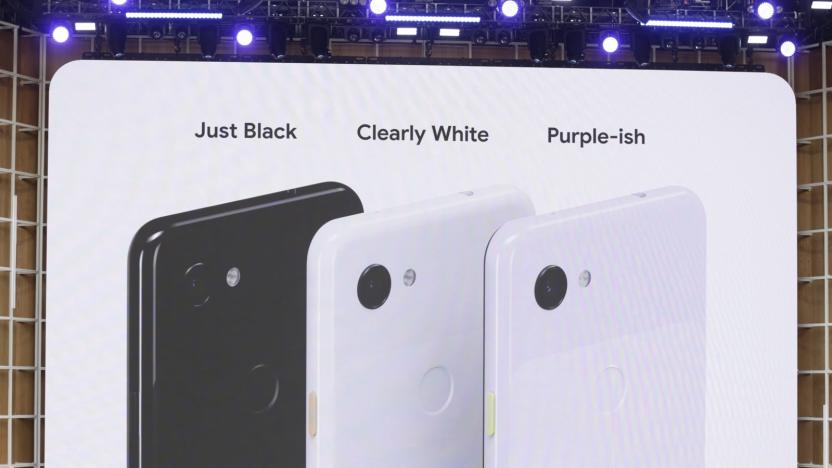
Google unveils the lower-cost Pixel 3a and Pixel 3a XL
Google's worst-kept secret in a long time is now official: meet the Pixel 3a and Pixel 3a XL. As expected, both phones are mid-tier devices aimed at people who want the Pixel line's photographic chops (not to mention a 'pure' take on Android) without the flashier hardware of the high-end Pixel 3. You still get the single 12.2-megapixel rear-facing camera along with Google's AI photography tricks (such as HDR+ and portraits), but they're now attached to more modest phones. There's 'just' one 8MP front-facing camera, no Pixel Visual Core, slightly lower-resolution displays, plastic bodies (without wireless charging or water resistance) and a Snapdragon 670 instead of the Snapdragon 845 from the flagships.

Pixel 3a XL review: Google's triumphant return to affordable phones
From the moment Google's Pixel 3 and 3 XL went on sale, us reviewers were largely in agreement: The phones' software was far more impressive than the hardware. Fair enough; Google is still pretty new at this "making its own devices" thing. But somewhere along the way, things took a turn. Shortly after launch, we started hearing about a litany of issues plaguing those Pixels, from increasingly sluggish performance to worrying battery life to camera-stability problems. It's not clear whether any of these failings specifically led to the disappointing sales Alphabet spelled out in the company's most recent earnings call, but they surely didn't help. So, what does a company like Google do when its flashy, premium smartphones aren't doing so well? In this case, the answer wasn't "launch some new flagships so everyone forgets about the last ones." Instead, Google decided to take the fundamentals of the Pixel experience and squeeze them into two new, affordable spinoffs: the $400 Pixel 3a and $480 3a XL. I know what some of you are thinking: Taking a phone with a shaky track record like the Pixel 3 has and stripping it down to its bare bones could be problematic. And on paper at least, it doesn't seem like the Pixel 3as should be all that interesting; they're cheaper versions of devices we've already seen, designed to appeal to people who don't want to drop $750 on a smartphone. After testing the Pixel 3a XL for a week, though, I'm starting to think Google might be onto something here. Yes, it's more limited in some ways, but those limitations never, ever felt like dealbreakers. If nothing else, the 3a XL is a surprisingly capable take on the Pixel formula that, in some ways, proves to be more valuable than either of the models that came before it.

Google turns Duplex into fancy autofill for Chrome
Duplex, Google's AI reservation feature, already knows how to dial a phone. Starting later this year, it will also be able to rent you a car or buy you some movie tickets online.

Google Nest Hub Max hands-on: A bigger, smarter display
I was surprised by how much I liked last year's Google Home Hub. The 7-inch smart display won me over with its beautiful screen and adorable design. It was also popular with other reviewers, who praised its clever Assistant features, affordable price and Photos integration. This year, Google has a bigger, more powerful model: the Nest Hub Max. Unveiled at the company's I/O developer conference today, the Hub Max is a 10-inch display that looks like a stretched-out Home Hub. But there are a few other differences besides the size that make it more useful than the smaller version.
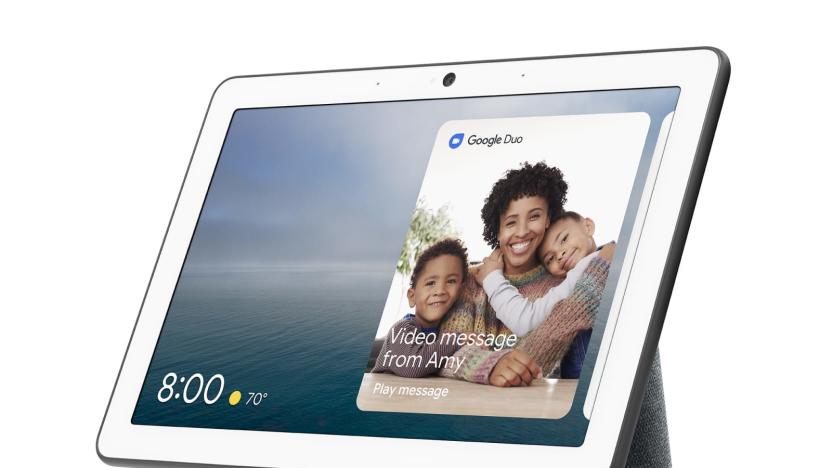
Google unveils the Nest Hub Max smart display
When we saw a leak of a device called the Google Nest Hub Max in March, we thought it was a little unusual. Why would a Google Hub device have the Nest branding on it? Now, we know why. At Google I/O, the company announced that it is finally folding its Home brand of products into Nest, and the first product from this Home-Nest team is, indeed, the Google Nest Hub Max.
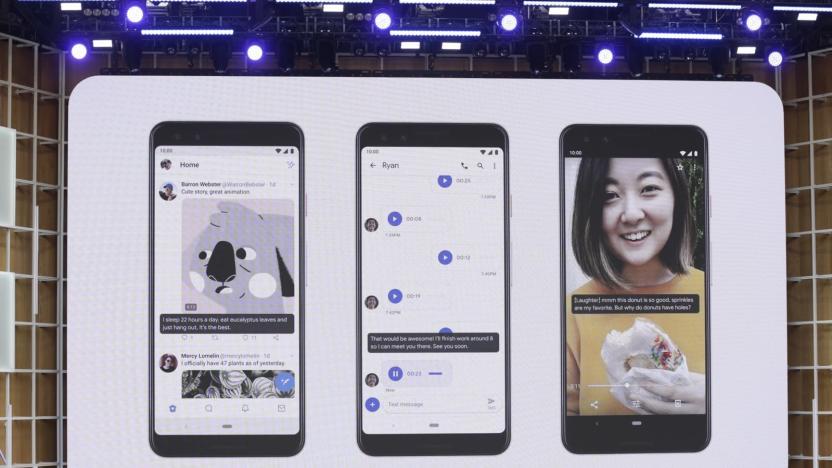
Android Q will feature dark mode, live video captioning and lots more
Google likes to drop plenty of surprises at its annual I/O developer event, but there's one thing we always know we'll hear about: the state of Android. Specifically, the next version of Android, currently only known as Q. As usual, Google released a developer-only beta back in March, and today senior director of Android Stephanie Cuthbertson was on stage going through more details about the forthcoming release.

Google's privacy push adds Incognito Mode for Maps and Search
Among the new developments announced at Google I/O 2019, CEO Sundar Pichai revealed tweaks that will impact data retention and privacy. Filters that auto-delete web & app activity will become available starting today with support for auto deleting your location history "in the coming weeks," and he also announced extensions for the Incognito Mode you're familiar with from Chrome. Google rolled out a version for YouTube last year, and soon, it's coming to Google Maps too. After that, it's coming to Google Search "this year." If course, Incognito Mode doesn't mean all tracking is disabled, but just like Chrome, that activity shouldn't show up linked to your profile. And as Google continues to expand the use of machine learning and accumulate more data about us, the company is as concerned as ever about making sure users feel like they're in control of it. One final tweak will make your Google Account (and associated privacy settings) easily accessible from within its apps under your profile photo.

Google Assistant will understand even more about your life
Google Assistant will be able to use information you share with it about the people, places and events in your life so it has a stronger understanding of queries related to them. Google Assistant VP of engineering Scott Huffman said, with the Personal References feature, it'll have better context for queries such as "weather at Mom's house" or asking it to remind you to buy a gift before someone's birthday. With an eye on privacy, Huffman said you'll be able to add, edit or delete those details at any time from the You tab in the Assistant app settings.
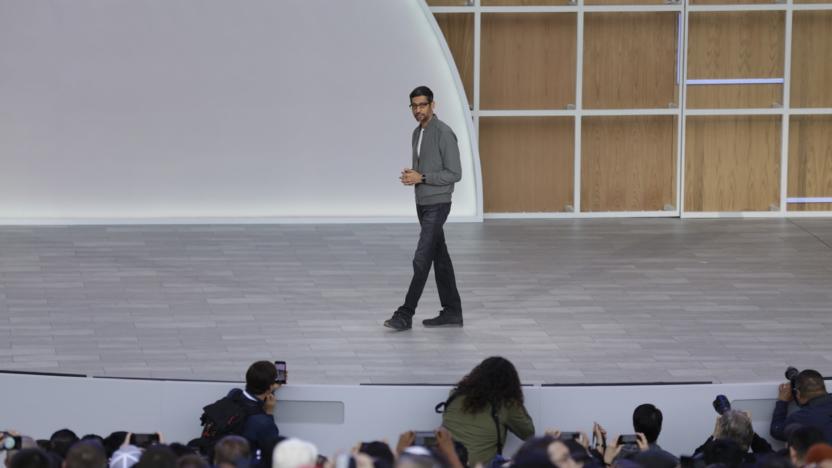
You don't have to say 'Hey, Google' to shut off your alarm anymore
Sometimes, the smallest changes are the most welcome ones. Google has removed the requirement to say "Hey, Google" before turning off an alarm or timer, streamlining the Assistant process while simultaneously making millions of mornings just a little better. Instead of mumbling, "Hey, Google, stop," three times into your pillow, at increasing levels of sleep-deprived frustration, you're now able to simply shout, "Stop," as many times as necessary. Assistant head Scott Huffman capped his presentation about a suite of new features with the news about alarms and timers, to a ringing round of applause. Apparently, there are a lot of snoozers in Silicon Valley.
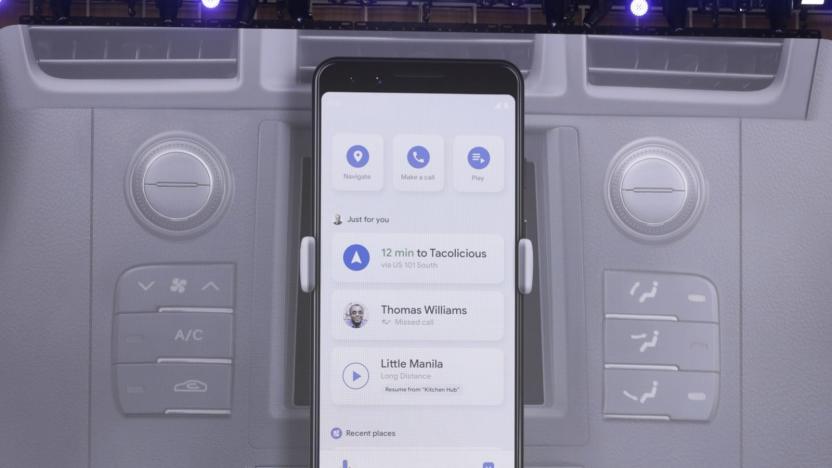
Android phones are getting an Assistant-powered driving mode
Google Assistant is about to become a much more helpful passenger while you're on the road. The assistant is getting a new "driving mode" with voice commands that should make it easier to interact with your device and access the information you need without ever taking your hands off the wheel. The new feature, announced during Google I/O, will be made available to all Android phones with Google Assistant later this summer.
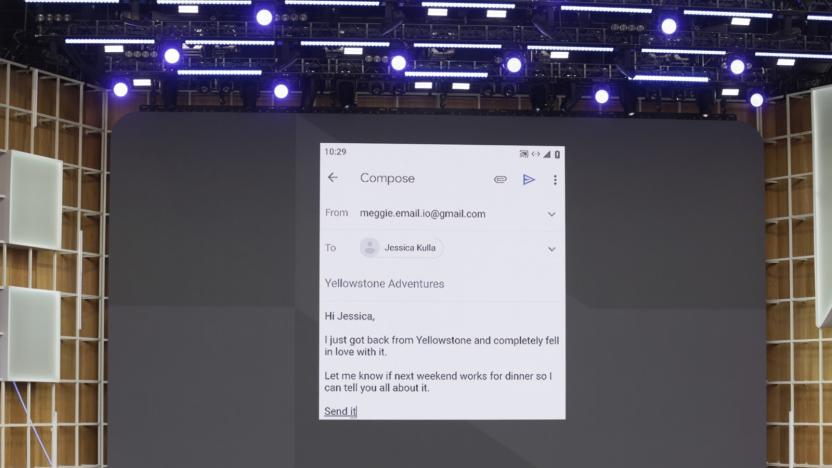
Next-gen Google Assistant is crazy fast
It's been a year since Google first introduced Duplex, its automated reservation-making feature for Assistant. The AI phone caller has rolled out to customers in 44 states, as well as non-Pixel handsets, and even spawned a corollary service for small businesses: Calljoy. At the I/O 2019 conference in Mountain View, California on Tuesday, Google announced that it will be expanding the service to web tasks as well, starting with vehicle rentals and movie ticket purchases. The new feature, Google CEO Sundar Pichai explained to the assembled crowd, will work very much like the current phone-based reservation system: users simply open Assistant and, in the case of renting a car from National, say "book me a car through National." The Assistant will then automatically open the National website and begin filling in the required fields on the user's behalf. The user will be prompted to confirm details like the rental dates and class of vehicle throughout the process, but Assistant will be doing the data-entry drudgery. Pichai also points out that this process requires no work or modification on the part of online businesses. Rather the new feature is an early example of Google's "Duplex on the web" program. Duplex's ability to understand your commands relies on a complex series of machine learning models. Typically, running these algorithms on a mobile device requires around 100GB of storage and an internet connection, Pichai explained. "Think of it as putting the power of a Google data center in your pocket," he said. However, he continued, Google has made a breakthrough in deep learning techniques and has managed to condense and combine that 100GB of models down to just half a gigabyte (0.5GB). That's small enough to fit onto mobile devices, allowing them to run the algorithms locally, thereby drastically reducing network latency. It's so fast, Pichai quipped, that it makes tapping your phone to activate Assistant seem slow. This "next generation Assistant" as Google VP of Engineering, Scott Huffman describes it, is so fast that it operates in real time. In the subsequent demo, a Google employee activated the Assistant and then rattled off a litany of commands and request, which the system handled without a hiccup. It also enabled the employee to quickly look up information and multitask between apps without having to flip back and forth between various screens. The next Assistant will also be far more personalized to the preferences of individual users thanks to the new Picks for You function. As Huffman demonstrated during the keynote, if the Assistant has previously helped you look for barbecue or Italian recipes in the past and you ask it what you should make for dinner tonight, it will likely recommend bbq and Italian recipes to make tonight. "What I love is that different people get completely different results," Huffman exclaimed. It will only be available on smart displays like the Home Hub when it launches later this summer. Recipes, podcasts, and events will be the first subjects available for personalization. As for the new Assistant, it's expected to roll out to Pixel phones later this year.

Google Search adds AR and big Lens upgrades
Google is going to start displaying search results in augmented reality, the company announced today at its I/O 2019 developers conference. "Sometimes what's most helpful in understanding the world," Google CEO Sundar Pichai said on stage, "is being able to see it visually." The idea, he added, is to bring visual information directly into search by letting users take advantage of their smartphone's camera. Google said it will use a combination of computer vision and augmented reality to turn your phone into a powerful search tool, whether you're looking to shop or wanting to learn more about the Solar System.

We're live from the Google I/O 2019 keynote!
What a beautiful time of year this is: it's finally, properly warm again, the rains have (temporarily) subsided, and we'll be at Google's I/O developer conference to get a better sense on what the search giant has been working so diligently on. Some of Google's biggest announcements might not actually be surprises anymore, but no matter — we'll be covering the big, day one keynote live right here.
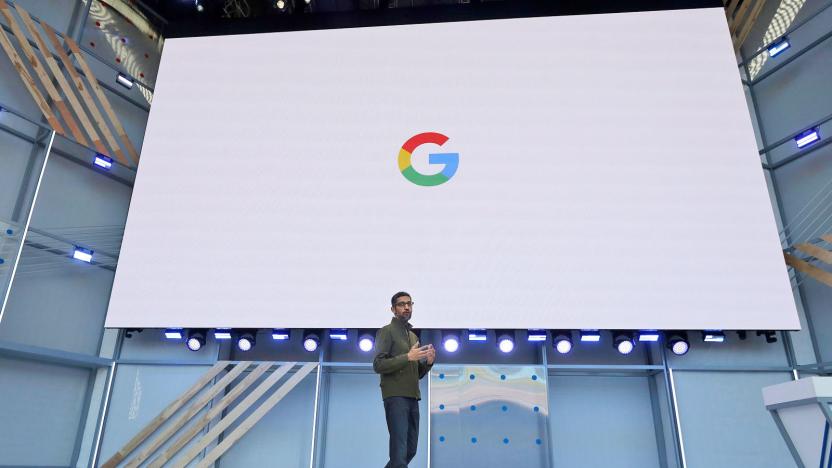
How to watch Google's opening I/O 2019 keynote at 1PM ET
This year's Google I/O keynote promises to be a special one. For the first time in a long while, Google has confirmed there will be new hardware -- new Pixel phones are virtually certain, while a Nest smart display could also be in the cards. And that's not including the usual news about AI, Chrome and the seemingly inevitable surprises each year. Thankfully, you don't have to miss a minute of it. Google is livestreaming the keynote both below and on its I/O event page starting at 1PM Eastern. And if you can't watch or just want to stay one step ahead of the action, you can tune into our liveblog to follow the developer conference as it unfolds.
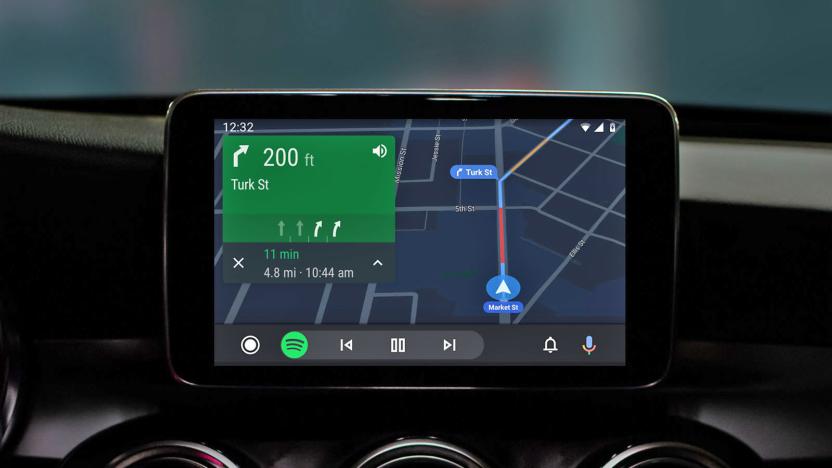
Android Auto redesign helps you focus on the road
As helpful as Android Auto is, it's hard to deny that it feels a bit dated when you can still see some of its 2014 roots. Thankfully, it's about to get a serious makeover. Google has unveiled a new Android Auto interface that's designed to keep more of your attention on the road and, ultimately, adapt to the reality of modern touchscreen-centric cars.

What to expect at Google I/O 2019
May has begun, and that means the latest iteration of Google's I/O developer conference is right around the bend. Usually, that translates to a deluge of new software, AI breakthroughs and web technology. And we're still expecting plenty of that at this year's show. This time around, however, there's a bit of a twist: Google confirmed during its latest financial results call that it will make hardware announcements at I/O, breaking a device drought from the past few years. But what does it plan to reveal, exactly? Here's a primer on what to expect so that you're prepared for whatever appears onstage on May 7th.

Google opens Android infotainment system to third-party media apps
Now that Google has a full-fledged car infotainment platform in Android Automotive, it's opening the door to apps built for that platform. As of Google I/O, developers will have the power to create media apps for Android Automotive-equipped cars like the upcoming Polestar 2. It's using the same underlying framework as Android Auto, which should ensure that a favorite music or audiobook app will work properly across different touchscreen sizes and car customizations.
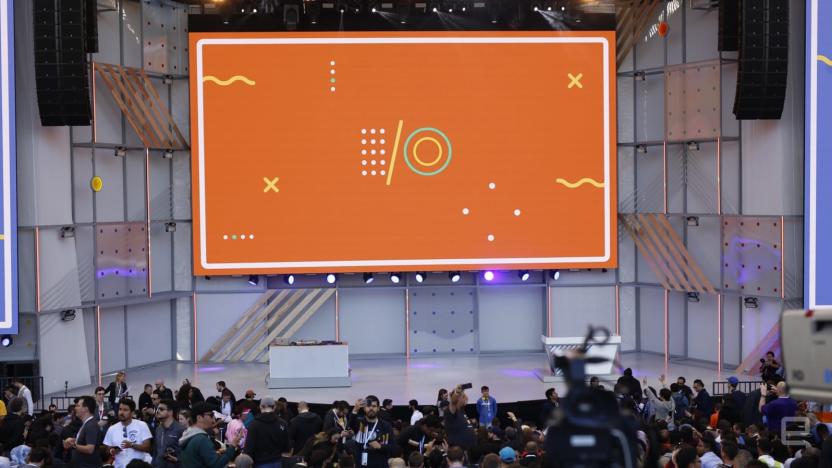
Google's next I/O conference begins May 7th
If you're a fan of all things Google, you already have a date to mark on your calendar for 2019. Developer Till Kottmann has 'cheated' Google's I/O conference puzzle to reveal that this year's event will take place between May 7th and May 9th at the familiar Shoreline Amphitheater in Mountain View. We've since confirmed the timing with Google. While the news is likely coming sooner than Google anticipated, you might want to try solving the puzzle yourself if you're a coder -- Google is promising free tickets to those who decipher the clues as intended.










